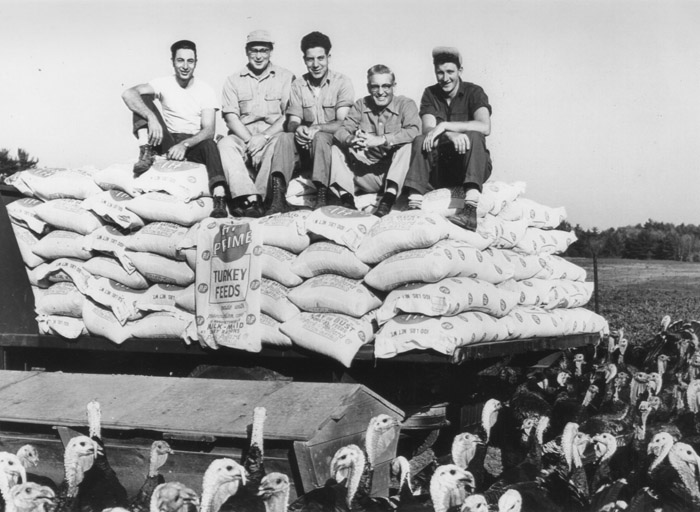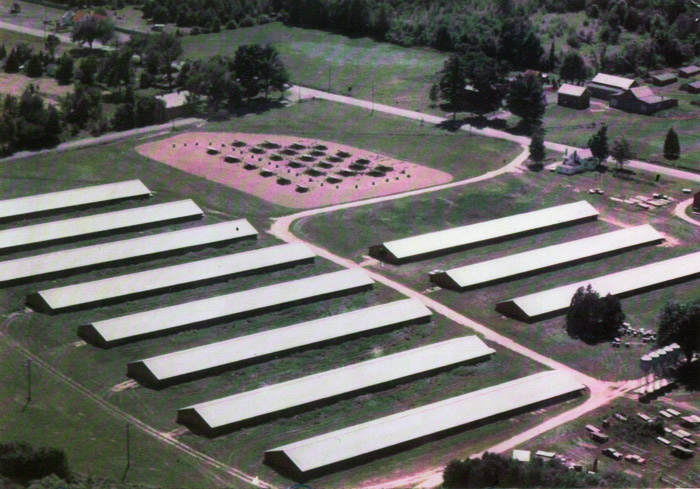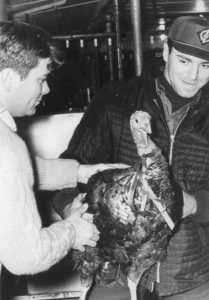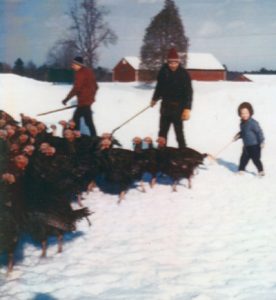By Mark Frost, Chronicle Editor
The Pepper Turkey Farm along Route 9 in Wilton was a landmark business in northern New York until it suddenly ceased operation on a Friday night in 1971 as they geared up for the Christmas rush.
“The famous Don Pepper Farm is dead,” a recorded voice told people who thereafter phoned the farm. Speaking was Dorothy Pepper Bull, wife of the late Don Pepper. She and their sons Don, Jr. and John kept the farm going after Don Sr.’s death.
It stood in part on land that is now home to SUNY Adirondack’s Wilton campus.
“Donald H. Pepper, the original proprietor, gave his life to building a business and a product of which he was very proud,” said Dorothy in the recording.
“This business was successful for 35 years and it took one for New York State Department of Agriculture officials to make it necessary for me to make my decision to close our modern dressing plant. This happened December 16, 1971.

“The recommended changes made by the Department of Agriculture officials would have made our small operation inefficient and unprofitable. Many people are calling to order turkeys or to ask where they can find a New York State grown fresh turkey. Perhaps if you call John Stone, assistant commissioner of the New York State Department of Agriculture, he could tell you. Thank you for your past patronage.”
I’ve written about the Pepper Turkey Farm and its plight many times, starting in 1977, when John Pepper told me, “They wanted us to change our whole line around.”
Don, Jr., said, “We normally started killing at 6 o’clock (p.m.). At 5:30 they walked in and says, ‘You’re not killing any turkeys, ‘til you make these changes.’ I wish I had the list. It was nine miles long.”
John said, “It’s just the timing was so perfect. There was nothing we could do. It was too late to get anyone on Friday night. By Monday it was over.”

Don, Jr. said, “You talk about Gestapo agents coming in. That’s just the way they came in. Just to show the audacity — rubbing salt in the wound — the guy called me the next afternoon and asked if we had made all the changes.”
State acted pursuant to federal law
What the Peppers and perhaps other small operators didn’t realize is the New York officials were enforcing a federal law that doomed producers like the Peppers.
Three years earlier, President Lyndon Johnson said on Feb. 6, “I recommend the Wholesome Poultry Products Act of 1968.”
On June 13 the House approved it 351-15. On July 29 the Senate okayed it 73-0. On Aug. 18, the president signed it into law.
Rep. Spark N. Matsunaga declared on the House floor, “Mr. Speaker, the Congress of the United States is too often pictured as a body politic yielding to pressures of highly paid lobbyists. By passage of the Wholesome Poultry Products Act we will have proved the falseness of that picture, for it is well recognized that the American consumer is without any paid lobbyists in Washington.”
But delving into the record of the legislation — which I did in the late 1970s sponsored by my constitutional law professor at the University of Maryland School of Law — most of the testimony supporting passage of the law wasn’t selfless. It came from advocates of Big Business and Big Labor.
Big biz & union interests testified
Frank Frazier, executive vice president of the National Broiler Council, represented automated poultry plants that he said used “palletized coop handling; automatic killing; giblet pumping, skinning, and wrapping systems; continuous chilling systems; automatic sizing and weighing; automatic icing; automatic box closing; palletized and motorized handling of the finished porducts; and sanitary overhead conveyor systems.” Poultry left the plant virtually untouched by human hands.
The Peppers did their work by hand, one bird at a time.

Marvin Johnson, president of the National Turkey Federation, said his own operation in 1967 included “1.5 million head of turkeys and about 15 million broilers.”
The Peppers might handle 45,000 turkeys a year.
Arnold Mayer, of the Amalgamated Meat Cutters union, said, “we believe that we have a responsibility — as a union of food industry workers — to aid consumers. Also, we have a self-interest goal: Our members working in poultry plants are protected from illness if the plant is clean and the product is wholesome….”
The big, year-round poultry plants were much more likely to be unionized. At holiday time, the Peppers employed part-time high school students, like “Jungle” Jim Mosher, who with his wife Becky owns Harris Grocery in Lake Luzerne and contacted me after a previous story. He remembers his time at the Pepper Farm fondly.
The call from industry and labor officials and from consumer advocates was for “uniformity” — the same practices enforced on every producer.
What it meant in practical terms is that a plant that might process 45,000 birds a year had to buy the same equipment as one that processed birds a day.
The Peppers quick chilled their slaughtered turkeys in a vat of ice water. Now they’d need a much more expensive automated chiller.
Small farms’ poultry still had buyers
Up to and even after World War II, chicken farms were small and nearby.
Then in 1957, a federal law was enacted standardizing poultry inspection and packaging requirements. It transformed America. Within 10 years, by 1967, 85 to 87 percent of chickens and 94 percent of turkeys were federally inspected — and prices fell, too, from an average 51 cents a pound in 1957 to 41.3 cents in 1967.

But the 1957 law exempted the little guys like the Peppers.
Very few of them made it to Washington to testify when Congress considered the Poultry Products Act of 1968. Albert J. Russo was the rare one who did.
He testified on his own behalf and as president of the Northeastern Poultry Products Council (NEPPCO).
“I reside in Hope Valley, R.I., where I am engaged with my father and two brothers in the operation of Chickadee Farms, Inc. We have a flock of 40,000 laying hens producing table eggs, a large flock of breeder hens producing hatching eggs and raise several thousand broilers, capons and turkeys each year….
“Most of our customers have visited our farm at one time or another and the success of our business lies in producing a better quality product and offering better service than our chainstore competitors. For this we ask for and receive a better price…
“However, we have a small plant compared to our inspected competitors. Most weeks of the year, we slaughter less than 2,000 birds. The majority of NEPPCO’s turkey grower members raised less than 15,000 birds a year and slaughter most of them in the last 3 or 4 months of the year.
“Obviously their dressing facilities are quite small. Must of the slaughtering is done in the evenings and over weekends…and a lot of the work is done by hand….
“We work 16- or 17-year-old high school boys in our dressing plants. They are juniors and seniors in high school, and they work from 3 to 3:30 every night.”
He said his poultry sold for 20 cents a pound more than the chainstore average.
Another small operator — Lawrence Dean of Dean’s Turkey Farm in Morrice, Michigan — asked to put into the record an article from National Turkey News.
“How can local turkey growers compete with chain-store prices?” the article asked. “They don’t! New Jersey turkey growers feel that in any populated area, there is always a percentage of the population which prefers to drive out to the farm and buy a locally grown and dressed turkey and is willing to pay a premium price for such a bird…”
Mr. Russo as if presumed guilty
The small farmer Mr. Russo got a hostile reception.
Rep. John Myers asked, “You have somebody that inspects the birds?”
Mr. Russo replied, “That is right…There is an inspection of the bird all along the line where it could be pulled out.”
Rep. Thomas Foley asked, “Does he have any special training for this purpose?”
Mr. Russo said, “He has not formal training. In my case, I have two brothers, both of whom are agriculture graduates and are taking particular courses.”
Rep. Foley said, “You would not claim that any of them have any special veterinary training in pathology to detect toxemia, for example?”
Mr. Russo replied, “I do not believe they could detect that without tests.”
Rep. Myers asked, “Have you ever had any complaints?”
“No,” said Mr. Russo.
“From the health department?” asked Rep. Myers.
“No, sir. We certainly know a sick bird from a healthy one, Mr. Foley….We have one distinct advantage here, I think. When we go to catch these birds to bring them into the dressing plant, we are handling them alive….”
Rep. Foley asked, “Do you think that the consumers would be satisfied to have the operators do [the inspection]. Do you think that the operators of the business, doing their own inspection, would raise any conflict of interest problem?”
Mr. Russo replied, “I do not think that a good operator who had his business at stake is going to do anything to violate this.”
Rep. Foley said, “What about a bad operator.”
“He would not be in business very long,” replied the farmer Mr. Russo.
Expert: Inspection is flawed anyway
And how good is the inspection anyway at these highly automated USDA plants?
The rare person to ask that question of the Congress was Dr. Oscar Sussman, senior meat instructor in meat inspection at Rutgers University in New Jersey.
Dr. Sussman said, “Mr. Chairman, I worked on a poultry inspection line. I have worked in a hog slaughterhouse.
He said a USDA poultry inspector inspects the birds as they move past him “at the rate of 1,200 birds an hour.”
Dr. Sussman said, “I maintain he could not pick up 10,000 pieces of paper with the words ‘Good’ or ‘Bad’ on them and put them in proper piles day after day and not be wrong innumerable times…
“It is just an impossible task to determine in two seconds whether a bird is sick or not and with what.”
Dr. Sussman pleaded, “the legislation in question would not only not protect the consumer but would in fact give a false sense of security plus increasing his tax burden…”
Dr. Sussman testified, but the Representatives asked him no questions.
The law passed. Three years later, on a Friday night in December, the hammer came down on the Pepper Turkey Farm as it did on similar sized poultry farms.
Periodic salmonella outbreaks and other issues arise in poultry and other federally inspected products. And supporting the little guy to a certain degree is back in vogue.
Much too late for the Peppers.
Even after the farm closed, people rallied to it. In 1978, The Saratogian ran a letter to the editor from a George J. Reilly in Mechanicville. “The Agricultural Department of New York State should be real proud of themselves. A few years ago, the Department closed local turkey farms, such as Pepper’s Turkey Farm, because they didn’t like the way the owners prepared their turkeys…This might be cited as another example of stifling small business, in order to cater to larger enterprises.”
Jim McCarroll, Jr., of McCarroll’s Market in Slingerland wrote, “Thanksgiving without a Pepper Turkey, like Christmas without Santa. Words just can’t describe the feelings I have for the Pepper family of Saratoga. Never have I had the pleasure to meet such a dedicated, honest, hard-working family. The farm was immaculate; the processing rooms were spotless and the sincerity was genuine. Their goals could be described in one word: Perfection. And believe me, a Pepper turkey was just that — ‘Pure quality.’
“It took many years of endless toil, sacrifice and determination for the Pepper family to make a dream come true. Their progressive success story could be an inspiration to anyone with a dream and a desire to succeed — but their abrupt ending would be enough to discourage any red-blooded American from taking the initial step. I for one, plus thousands of others, shall miss them.”
A half-century later I still miss the Pepper Turkey Farm, and see its fate as cautionary. There’s no safety for the little guy in simply minding your own business when Big Government, Big Business and Big Labor join forces far away to drastically change the rules of the game.
Copyright © 2018 Lone Oak Publishing Co., Inc. All Rights Reserved.
 Glens Falls Chronicle Serving the Glens Falls/Lake George region; Warren, Washington and northern Saratoga counties since 1980
Glens Falls Chronicle Serving the Glens Falls/Lake George region; Warren, Washington and northern Saratoga counties since 1980

